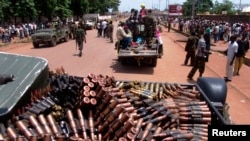GENEVA —
The United Nations Children’s Fund reports it has flown 23 tons of emergency aid to the conflict-stricken Central African Republic. UNICEF says this is the first significant delivery of relief supplies to the CAR following recent weeks of insecurity and looting in the country.
The special UNICEF-chartered flight reached the CAR capital, Bangui, on Sunday, two weeks after the rebel coalition Seleka seized power in this landlocked and conflict-ravaged country.
The overthrow of the previous president, Francois Bozize, who has fled to neighboring Cameroon, ushered in a period of great insecurity and looting. UNICEF spokeswoman Marixie Mercado says that late last month more than 10 tons of emergency materials were looted from the warehouses of UNICEF, other U.N. agencies and non-governmental organizations.
“Initial assessments in the Bangui area show that hospitals and health centers have been totally looted and in some cases vandalized," she said. "Sanitation equipment has also been looted and garbage has not been collected in the past two weeks. We now estimate that some 650,000 children are shut out of school. We fear the previous estimate of 13,500 children who would suffer from life-threatening malnutrition this year will increase. UNICEF has verified cases of child rights abuses by all parties to the conflict, including recruitment into armed forces and groups, gender-based violence and denial of humanitarian access.”
UNICEF estimates the entire population of the CAR - about 4.6 million people - is directly affected by the conflict due to the collapse of services and law and order.
The UNICEF supplies flown into Bangui include emergency medical kits to treat about 200,000 people. While medical and other supplies will be used to help adults in need, Mercado says aid is mainly directed toward children, who constitute more than half of the population.
“This delivery of supplies includes, for example, obstetric supplies for safe deliveries, a lot of water and water storage equipment so that children can drink safe water because they, of course, are the most vulnerable to illness caused by dirty water. We have brought in enormous amounts of therapeutic supplies for severely malnourished children,” she said.
Following the past few chaotic weeks, UNICEF reports signs of normalcy are beginning to appear in Bangui. But, it hastens to add, the situation there remains precarious.
The agency says the situation in the more remote northeastern part of the country is more difficult and dangerous. It says 1.2 million people who live there have been cut off from basic services for over four months.
The special UNICEF-chartered flight reached the CAR capital, Bangui, on Sunday, two weeks after the rebel coalition Seleka seized power in this landlocked and conflict-ravaged country.
The overthrow of the previous president, Francois Bozize, who has fled to neighboring Cameroon, ushered in a period of great insecurity and looting. UNICEF spokeswoman Marixie Mercado says that late last month more than 10 tons of emergency materials were looted from the warehouses of UNICEF, other U.N. agencies and non-governmental organizations.
“Initial assessments in the Bangui area show that hospitals and health centers have been totally looted and in some cases vandalized," she said. "Sanitation equipment has also been looted and garbage has not been collected in the past two weeks. We now estimate that some 650,000 children are shut out of school. We fear the previous estimate of 13,500 children who would suffer from life-threatening malnutrition this year will increase. UNICEF has verified cases of child rights abuses by all parties to the conflict, including recruitment into armed forces and groups, gender-based violence and denial of humanitarian access.”
UNICEF estimates the entire population of the CAR - about 4.6 million people - is directly affected by the conflict due to the collapse of services and law and order.
The UNICEF supplies flown into Bangui include emergency medical kits to treat about 200,000 people. While medical and other supplies will be used to help adults in need, Mercado says aid is mainly directed toward children, who constitute more than half of the population.
“This delivery of supplies includes, for example, obstetric supplies for safe deliveries, a lot of water and water storage equipment so that children can drink safe water because they, of course, are the most vulnerable to illness caused by dirty water. We have brought in enormous amounts of therapeutic supplies for severely malnourished children,” she said.
Following the past few chaotic weeks, UNICEF reports signs of normalcy are beginning to appear in Bangui. But, it hastens to add, the situation there remains precarious.
The agency says the situation in the more remote northeastern part of the country is more difficult and dangerous. It says 1.2 million people who live there have been cut off from basic services for over four months.




